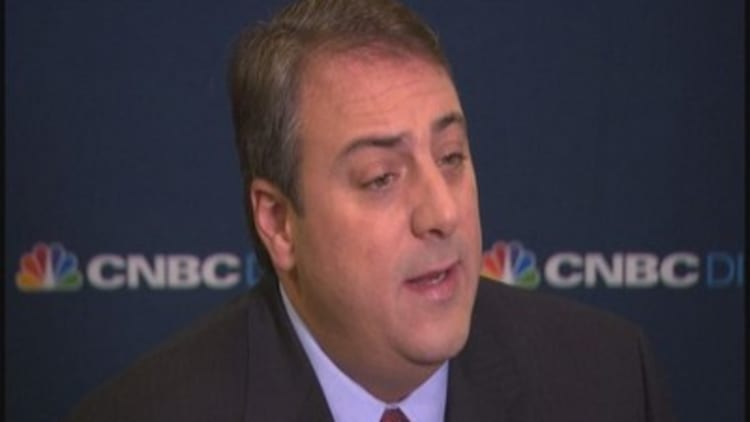Market volatility can be one of the scariest things investors face. But ask financial advisors and they will tell you to relax.
If you are young and the money you have in stocks is for retirement, the potential return is worth the risk. If you are close to retirement or in retirement, your assets should not all be in risky investments, anyway.
"Where you are in life is the most important variable that causes [volatility] concern," said Ken Moraif, a certified financial planner and senior advisor at Money Matters. "The closer you are to retirement, the more important preservation of principal becomes."
The financial crisis of 2008 illustrated how a down market can cause investors to panic. Between October 2007 and March 2009, many investors watched their portfolios lose more than 30 percent of their value. The problem, though, was that many of them pulled their money out of the market near the bottom.
"Most of our clients didn't do anything, but a few said they couldn't do it anymore and they moved to bonds or cash," said Daniel Lash, a CFP with VLP Financial Advisors. "Afterward, watching [stocks] go back up, we went to them and said, 'Here's why we should have stayed in the market.'"
From the market's low point in March 2009 through October of this year, the has returned 159 percent. On an annualized basis, that figure is 21 percent.
Read MoreTime for a risk checkup
Lash said those clients who discovered they could not stomach the down market are back in stocks, but none are as aggressive as they once were.
"It's easy to say you're willing to see the market go down 30 percent, but it's not until you experience that kind of drop that you really know what you can handle," Lash said.
Katie Nixon, chief investment officer for wealth management at Northern Trust, said the market crash has had lingering effects on some investors.
"We have clients who sold low and still haven't gotten back in the market," Nixon said.
But she and other advisors point out that volatility is a natural part of the stock market and not all volatility will lead to a bear market.
"Right now it's not uncommon to see some volatility as investors take profits," Nixon said. "But we don't think this kind of volatility is going to lead to a bear market."
She said economic indicators are strong, and her company anticipates continued low interest rates over the next year.
Money Matters' Moraif said he compares market volatility to a yo-yo and an escalator.

"The yo-yo is the stock market, and the escalator is the direction of the economy," he said. "The important thing is the direction of the escalator. If the escalator is ascending, the yo-yo is just noise."
Nixon at Northern Trust said her company has been advising clients to be prepared for increased volatility in the stock market.
"We've been lulled into a sense of security in the last few years, so even an increase to normal volatility might feel more scary than it [should]," she said. "We've been talking to clients for quite some time about expecting higher volatility so they can see there will be no need to panic."
Read MoreThe risk-averse opt for options
She said investors should focus on what their money is for, whether it's for retirement that is decades away or for income you need to live.
"Even before you see any volatility, figure out how reliant you are on your risky assets for your lifestyle," said Nixon, explaining that if you rely heavily on your risky assets for income, they should be in safer investments, like cash or bonds, anyway.
On the flip side, if you have zero reliance on risky assets in the near term—i.e., you are many years away from retirement—maintain your risk exposure.
"Don't worry about it," Nixon said. "Markets ebb and flow. The long-term returns of risky equities is positive."
If the market were to collapse, it would mean that every single company ... had lost all its value. If that happens, Armageddon has occurred.Daniel LashCFP with VLP Financial Advisors
Occasionally advisors hear people question the long-term viability of the stock market and whether it could crash and simply never come back. Volatility can feed that fear.
But as Lash at VLP Financial Advisors pointed out, stock prices are based on the valuations of the underlying companies.
"If the market were to collapse, it would mean that every single company [on the stock market] had lost all its value," Lash said. "If that happens, Armageddon has occurred and we won't care about money, anyway. We'd only need ammo and canned goods."
Read MoreGauging risk tolerance
The point, Lash said, is that while it's impossible to guarantee what the future holds for the stock market—or for anything, for that matter—the chance of complete implosion is remote. And with volatility being a natural part of the market's long-term upward climb, protecting your money due to fears of a permanent crash only causes you to miss out on gains in the market.
"So do you try to plan for the thing that is so unlikely to happen, or do you plan for what is likely?" he asked. "The Earth will continue to revolve around the sun, you will get older, and you will have retirement goals and other things you'd like to accomplish. So that is what you need to plan for," he said.





